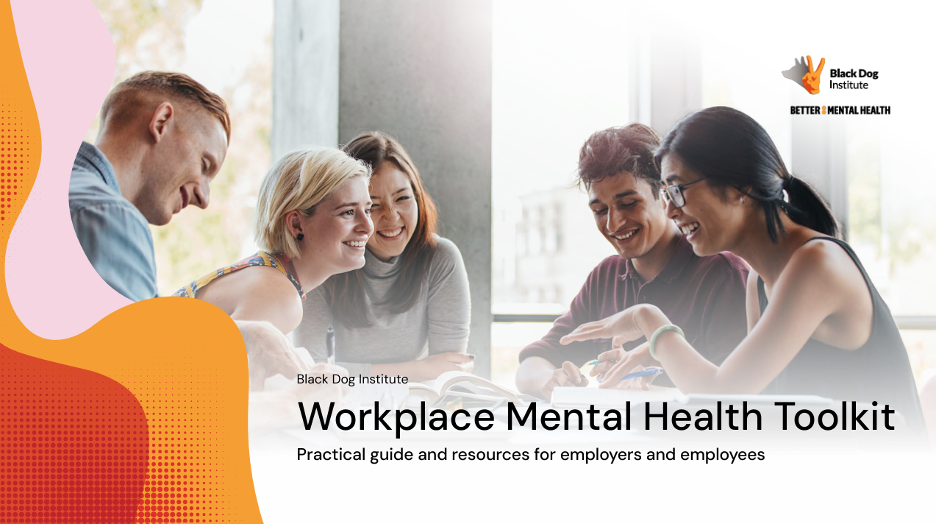Black Dog Institute Provides Practical Guidance for Organizations Seeking to Address Employee Mental Health and Wellbeing

Resource Recommendation by Caitlin Guilfoyle, MBA
The Workplace Mental Health Toolkit, developed by the Black Dog Institute, is a comprehensive, evidence-based resource designed to help organizations build mentally healthier workplaces. It addresses one of the most pressing issues in modern work environments: the rising prevalence of mental health conditions such as stress, anxiety, and depression, and their significant impact on workplace engagement, productivity, absenteeism, and culture.
This toolkit is intended to support both employers and employees in recognizing, managing, and responding to mental health challenges in the workplace. It provides practical tools to reduce stigma, promote open conversations, and foster supportive and safe environments where individuals can thrive both personally and professionally.
At its core, the toolkit tackles three key goals:
- Protect against harm by helping organizations understand and mitigate psychosocial risks.
- Promote positive mental health through proactive culture-building and wellbeing strategies.
- Respond effectively to mental health challenges by equipping individuals and leaders with the skills, knowledge, and frameworks to take supportive, informed action.
Intended Audience
The intended audience for the toolkit includes:
- Business owners, leaders, and HR professionals looking to embed wellbeing into organizational practices.
- Managers and team leaders who want to support individuals and build resilient, psychologically safe teams.
- Employees and peers who are navigating mental health concerns and want to understand their rights, responsibilities, and avenues for support.
This toolkit is practical, grounded in scientific evidence, and accessible to organizations of all sizes and sectors. It outlines:
- Common mental health conditions and behavioral signs to look for
- Legal rights and responsibilities under Australian workplace and anti-discrimination laws
- Guidance on having safe, productive conversations around mental health
- The importance of reasonable adjustments and how to implement them
- A workplace mental health framework (Protect–Promote–Respond) across four levels: individual, job, team/operations, and system/policy
How to Use The Toolkit
- Start by building awareness, using the sections on stress, anxiety, and depression.
- Use the psychosocial risk framework and self-audit tools to evaluate your current practices.
- Share the guide with leaders and team members to create shared language and responsibility around mental health.
- Apply the Protect–Promote–Respond model to build a holistic wellbeing strategy tailored to your organizational context.
- Supplement the toolkit with other Black Dog Institute tools, such as self-care plans, mental health self-assessments, and workplace programs.
This resource can be used for organizational strategy, policy development, training, and day-to-day wellbeing conversations. It is especially valuable for organizations wanting to move beyond compliance toward creating a genuinely supportive and sustainable culture of mental health and wellbeing.
The toolkit can be downloaded for free directly from the Black Dog Institute website after providing contact information using an online form.
About the Organization
The Black Dog Institute is a globally recognized medical research institute based in Australia, dedicated to understanding, preventing, and treating mental health conditions across the lifespan. It is the only institute of its kind in Australia that combines clinical services, research, digital tools, and education. The Institute translates world-class scientific findings into real-world programs that improve lives, with key areas of focus including workplace mental health, suicide prevention, and digital mental health innovation. Their approach integrates science, compassion, and action – working in partnership with government, health systems, workplaces, and communities.
**Disclaimer**
The Recommended Resources featured on this site represent recommendations from individual initiative members. The Global Wellness Institute and the Workplace Wellbeing Initiative are not responsible for the content provided. The views expressed are solely those of the authors and do not necessarily reflect an official endorsement of the resource by the Global Wellness Institute or the Workplace Wellbeing Initiative. Readers are encouraged to contact the organization that developed the Recommended Resource for more information.























































